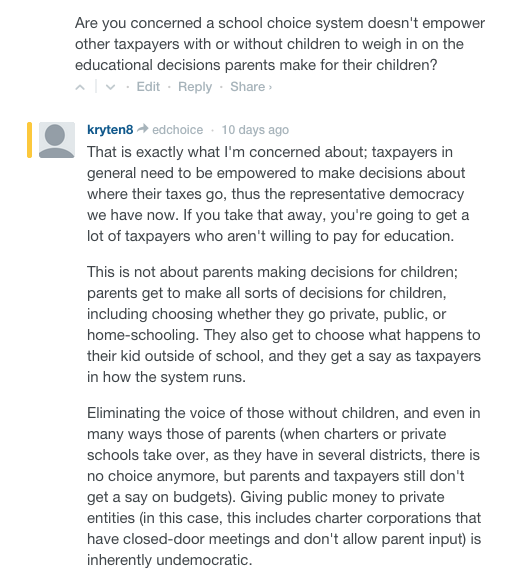Friday Freakout: Does School Choice Destroy Democracy in Education?
Today’s freakout comes to us from the comments section of The Atlantic article, “Saving School Choice Without Undermining Poor Communities,” and it concerns how implementing a school choice system would affect democracy in education by changing the ability of taxpayers and communities to influence public education. Check out how this conversation got started below.

Kryten8 brings up a common concern we hear from those who are accustomed to our present, ZIP Code-assigned public school system. Questioning how school choice might change democracy in education is completely fair. Thankfully, we can address these initial qualms by looking at the numerous programs out there as real life evidence.
It should be comforting to know no school choice program—and there are 51 of them all across the United States—has ever resulted in the elimination of local public school boards or representative democracy.
All voters and taxpayers have the opportunity to vote for their representatives—the same representatives who, by a majority vote, decide to turn a school choice proposal into law. That is how taxpayers get their say in how “the education system” functions for the public. Kids in private schools, charters, online schools, and home schools are all part of the public, too. Children in public schools, or government schools, are one part of the system, and when it comes to how public schools in particular are run, the process kryten8 is concerned about losing absolutely remains intact. Also, it’s worth noting that taxpayers without children have the opportunity to serve on charter and private school boards as well.
The core of this dialogue though is most definitely about parents making decisions for children. The basic question here is, what is education: politics or childrearing?
If education essentially belongs to politics, we could side totally with kryten8’s argument (although there still would be pragmatic arguments for school choice). But education is a key part of childrearing, not politics. If it were politics, our government wouldn’t even allow parents the choice to move to other districts “for the great schools” if it went against majority vote.
How a mom raises her daughter should not be up for a vote of the majority. The system kryten8 upholds would require a mother to forfeit what she knows is good for her daughter, because even the slightest majority believes it knows better. That kind of system—if it is truly against any form of expanded school choice options for every child, not just the affluent or the lucky—stands behind the disempowerment of that family and the academic suffering of that child.
School choice does not deny an equal voice to people without children. To say it does assumes that “the raising of children” is a single, massive, collective activity and the question becomes “Who gets to participate?” In fact, the raising of each child is a distinct activity, one that no one outside that particular family should have final say in (except where certain basic fundamentals of justice, such as child neglect, are implicated). Of course, educators are welcome to provide their expertise and advice to parents, but power to decide action should be with the parents.
The current public education system does just the opposite. It empowers those running the system to have the final say for children and leaves parents to fight or sue for the power to determine their own children’s path. We hardly think that was the intention of the public school democratic process, so we offer school choice as a way to fix that unintentional failing.
Like this post? Click here to browse more of our Friday Freakout series.




